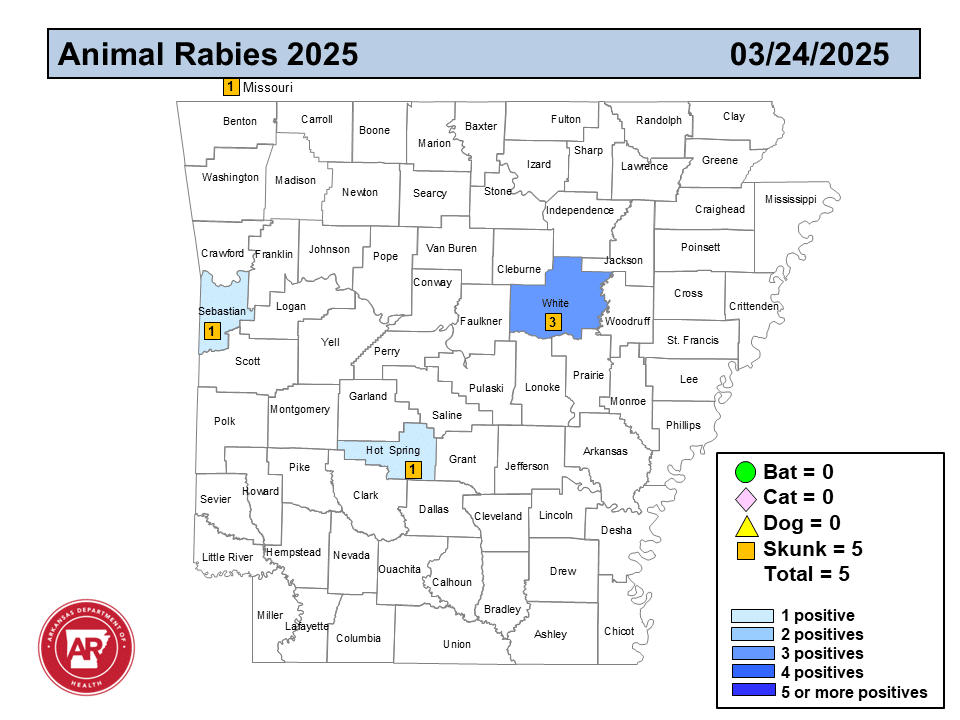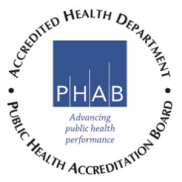Rabies Awareness and Prevention
**The ADH does NOT PAY FOR or PROVIDE the rabies post-exposure prophylaxis (PEP) at any local health unit. Please see the healthcare professional page for locations that do provide PEP. Consultation with ADH is NOT required for PEP administration, but all animal bites are required to be reported using the link on the animal bites page.
Rabies is a deadly viral disease that affects the nervous system of warm-blooded animals, particularly mammals. It is usually spread by an infected animal biting another animal or person. Rabies is a fatal disease that almost always leads to death unless treatment is provided soon after exposure. In Arkansas, rabies live and circulate in wild skunks and bats. Any mammal can become infected with rabies, including domestic pets such as dogs and cats, agricultural animals such as cows and horses, and people when they are exposed to rabid wildlife.
Arkansas rabies law requires that all dogs and cats must be vaccinated against rabies by four months of age by a licensed veterinarian, veterinary technician, veterinary technician specialist, or veterinary technologist. One shot is not enough; rabies vaccinations must be kept current, so talk with your veterinarian about when your pet needs its rabies booster shots.
If you find a bat in your home, isolate it to one room, leave the room, and close the doors. Call either an animal control officer or a nuisance wildlife control company to capture the bat for testing. Most human rabies cases in the United States are due to unrecognized or unreported exposures to bats. Most bats do not carry rabies; only about 2-3 percent of bats are infected. We cannot tell if wildlife is infected by looking at them; a laboratory test is required to determine rabies infection in wildlife.
The Arkansas State Public Health Laboratory tests animals for rabies. They test wildlife that has bitten or exposed a person or domestic animal. They also test pets that have bitten or exposed a person, get sick with signs of rabies, or die during 10-day confinement after biting a person. The laboratory will also test agricultural animals that show signs of brain disease or have potentially exposed a person. The laboratory discourages testing small rodents such as mice, rats, hamsters, etc., as they have never been known to transmit rabies to people and are not considered a risk for rabies exposure.
Contact the State Public Health Veterinarian by phone or email if you have questions.
Maps and Data

Downloads
- Rabies Activity in Arkansas 2024
- Rabies Activity in Arkansas 2023
- Rabies Activity in Arkansas 2022
- Rabies Activity in Arkansas 2021
- Rabies Activity in Arkansas 2020
- Rabies Activity in Arkansas 2019
- Positive Animal Rabies Results 1990-2018
Links
- AFMC TV Episode 176: Rabies Awareness
- Rabies Surveillance in the U.S. during 2022
- Global Alliance for Rabies Control (GARC)
- Global Alliance for Rabies Control (GARC) – Bats and Rabies Video
- Animal Rabies Compendium
- BOH Rabies Rule
- CDC Rabies
- AVMA Rabies and Your Pet
Contact Information
Zoonotic Disease
4815 W. Markham St., Slot 62
Little Rock, AR
Phone: 501-280-4136
Fax: 501-280-4431
[email protected]


